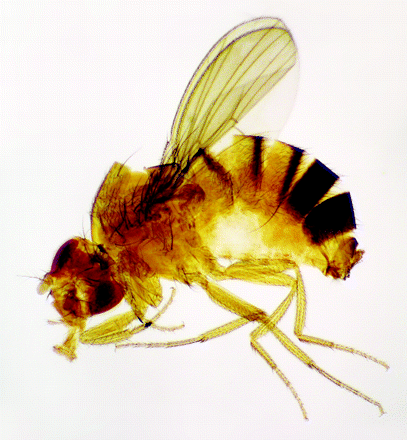Sites of interest on the World Wide Web
Ecce Sophophora!?
Although I am sure the famed fruit fly, Drosophila melanogaster, would rather keep to itself, one thing is for certain: the little beast has been stirring up quite a bit of controversy lately. The problem, it seems, is that this fly—one of biology’s most utilized research tools—may not be a Drosophila at all! In coverage ranging from Nature to The Times (UK) and even Fox News, the famous insect has been going through an identity crisis of sorts, stemming from evolutionary evidence that the fly is actually a member of the Sophophora genus. Proteins, such as receptors and channels, are sometimes renamed to fit within the IUPHAR nomenclature scheme, but those changes do not have the widespread ripple effect that this controversy has initiated. The case for the name change has been handled by the International Commission on Zoological Nomenclature (http://iczn.org/), which has recently issued its ruling. The case at hand was not challenging the classification of DrosophilaSophophora, but rather was brought in order to render a ruling on a motion that Drosophila melanogaster continue to be recognized as a “protected combination,” to preserve stability within the scientific literature and “served a wider global interest.” The opinion on the case issued by ICZN leans against protecting the combination, meaning that the name of the useful little workhorse (workfly?) of genetics and developmental biology will likely change to Sophophora melanogaster. The details of the case, as well as arguments for and against a change in name, are a very interesting read (http://iczn.org/content/drosophila-melanogaster-opinion-issued-case-3407).

Virtual Fly Lab
It seems that the fate of the name Drosophila melanogaster is on everyone’s mind these days. The Howard Hughes Medical Institute (HHMI) provides an impressive selection of Virtual Laboratories that can be used as teaching tools for a range of educational levels. The HHMI’s Biointeractive-Virtual Labs (www.hhmi.org/biointeractive/vlabs/) contains a Bacterial Identification Lab, Cardiology Lab, Neurophysiology lab, Immunology lab, and of course, the Transgenic Fly Virtual Lab. These labs, although quite fun to explore, are part of a larger set of tools for teachers, including videos, animations, and lectures that are of very high quality.

Organ Systems Pharmacology Course Resource
In this month’s MI, Mark Zimmerman writes about his experience in the Integrated Organ Systems Pharmacology (IOSP) course at Michigan State University, part of an initiative by the National Institute of General Medical Sciences. Mark’s firsthand account provides a great opportunity to learn the value of these short courses. ASPET maintains a Web page, the NIGMS Awards Four Institutions to Support Training in Integrative Organ Systems Sciences, that provides details on the four sites and focuses on the IOSP courses (www.aspet.org/Page.aspx?id=312). This site, and the courses highlighted, should provide a good starting point to embark on a fulfilling experience.

KEGG Database Includes ABC Transporters
In this issue of MI, Hartz and Bauer write about the regulation of ATPase-binding cassette (ABC) transporters at the blood-brain barrier, a very interesting topic for targeting diseases in the CNS, such as Alzheimer’s. The KEGG: Kyoto Encyclopedia of Genes and Genomes (www.genome.jp/kegg/) contains an impressive database of genes, proteins and pathways that many researchers find useful. Included in these databases are datasets on human ABC transporters (pathway hsa0210), including a dynamic graphical depiction of ABC transporter families and subfamilies, as well as links to disease and drug mapping, user data entry and mapping, and live links to individual protein pages, including sequences, references, alignments, SNPs, and other mutations. The KEGG database is a rich resource for researchers in a variety of fields, including the ABC transporters.

- Copyright © 2010



